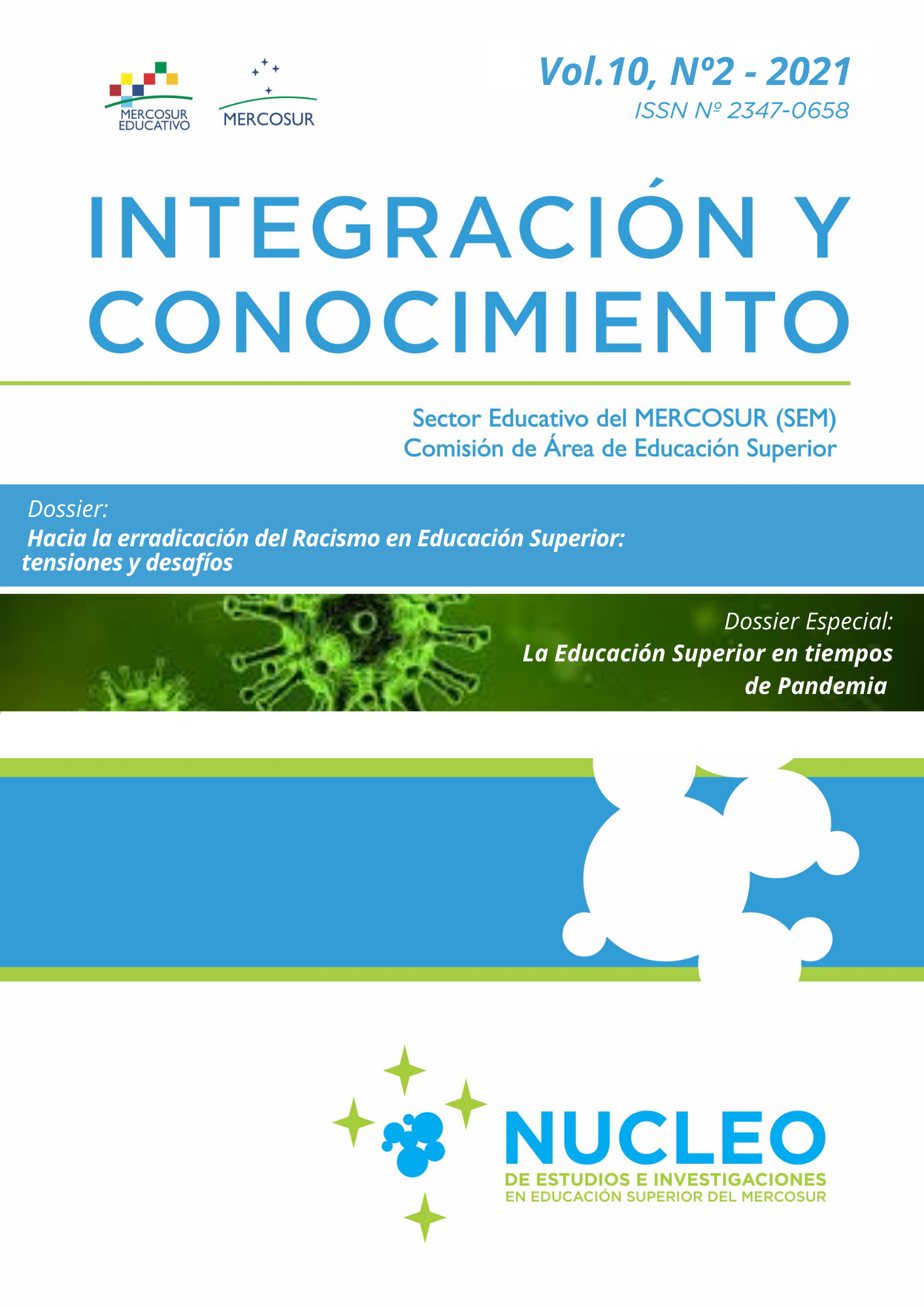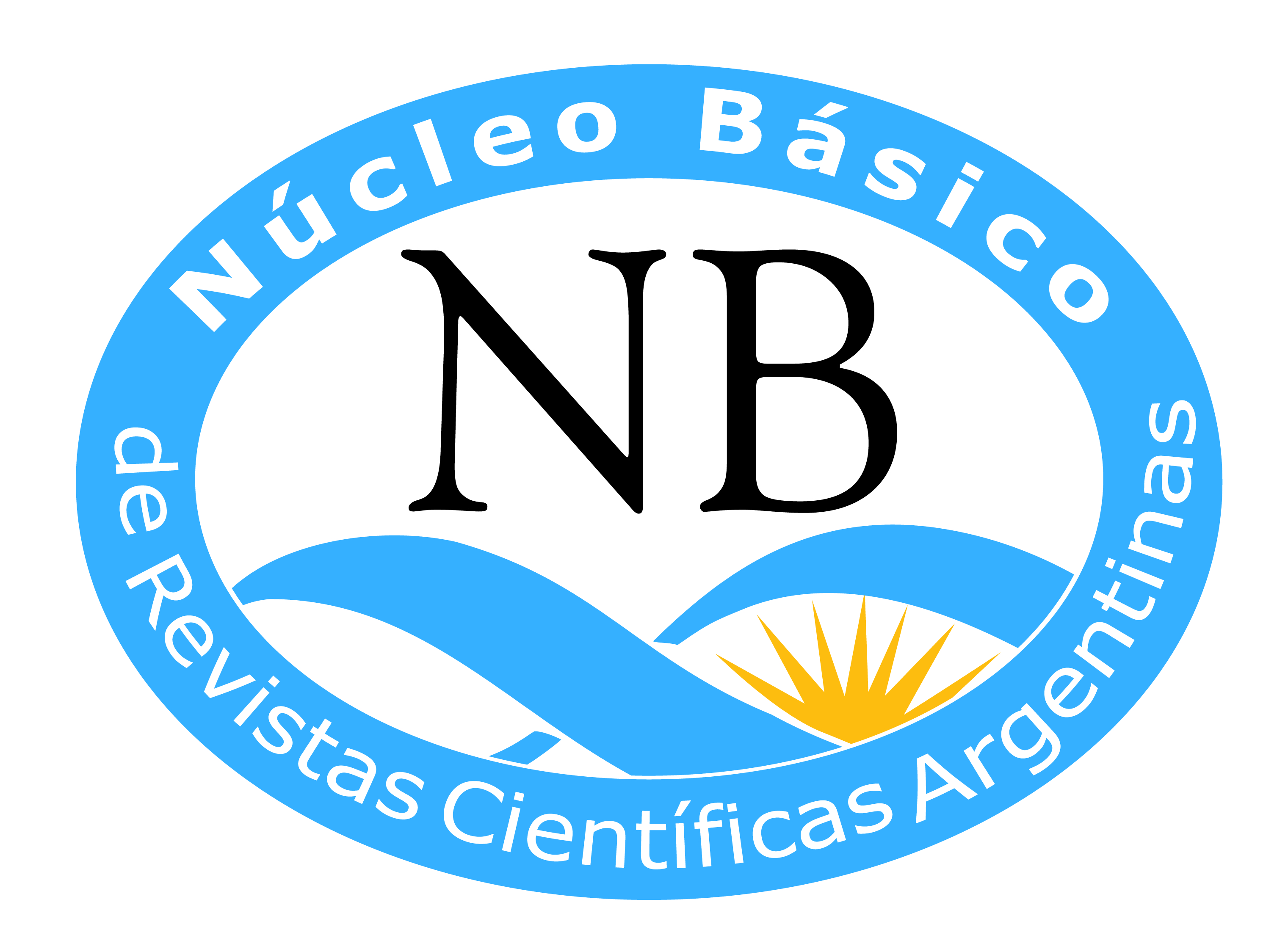Adeus, Humboldt? O Ensino Superior contemporâneo no contexto da globalização
DOI:
https://doi.org/10.61203/2347-0658.v10.n2.32405Palavras-chave:
ENSINO SUPERIOR, GLOBALIZAÇÃO, ESPAÇO TRANSNACIONAL, ORGANISMOS INTERNACIONAISResumo
O presente artigo tem o objetivo de abordar determinadas transformações que estão ocorrendo no ensino superior contemporâneo em escala internacional, impulsionadas pela dinâmica do processo de globalização que estão alterando seu modus operandi e a concepção intelectual das universidades. Num primeiro momento, destaca que ‒ao lado da presença de sistemas nacionais de ensino superior que se desenvolveram no decurso de seus respectivos contextos históricos‒ formou-se gradativamente nas últimas décadas um novo locus de sua atuação, ou seja, um espaço transnacional de ensino superior. Num segundo momento, o artigo aborda a elaboração de determinadas ideias e concepções formuladas por organismos internacionais e também por acadêmicos que atuam simultaneamente nos níveis local, nacional e transnacional que permeiam o ensino superior nos dias correntes. Nesta direção, o trabalho inspira-se numa nova perspectiva da sociologia dos intelectuais que concentra sua atenção em experts em determinadas áreas do conhecimento, localizados em diferentes espaços sociais (universidades, organismos internacionais, centros de pesquisa, think tanks, etc.). Este trabalho guarda uma proximidade com o conceito de tipo ideal postulado por Max Weber, na medida em que procura formar um quadro de pensamento a respeito do ensino superior contemporâneo em escala internacional.
Downloads
Referências
Altbach, P. (2004) Higher Educations Crosses the Borders. Change: The Magazine of Higher Learning, 36(2). 18-25.
Amaral, A. (2018) Universities and the knowledge society revisited. EnR. BarnettyM. A. Peters (Orgs). The idea of university: contemporary perspectives (pp.353-369). New York: Peter Lang.
Baert P. (2012) Positioning Theory and Intellectual Intervention. Journal for the Theory of Social Behavior, 42 (3). 304-324.
Baert P. y Morgan, M. A. (2017) Performative framework for the study of intellectuals. European Journal of Social Theory, 2 (3). 322–339
Ball, S. (2015) Living the neo-liberal university. European Journal of Education, 50(3). 258-161.
Ball, S. (2012) Global Education Inc: policy network and edu-business. London: Routledge.
Basset, R. (2010) International Organizations and the Tertiary Education Sector: understanding UNESCO, the OECD and the World Bank linking-pin organizations. En F. Maringe; N.
Foskett (Orgs). Globalization and Internationalization in Higher Education (pp.277-289). Auckland: Continuum.
Bauman, Z. (1997) Legislators and interprets. Cambridge: Polity Press.
Becker, G. (2009) Uncommon sense: economic insights from marriage to terrorism. Chicago: The University Chicago Press.
Becker, G. (1964) Human capital. A theoretical and empirical analysis with special reference to education. Chicago: The University Chicago Press.
Beck, U. y Cronin, C. (2006) The Cosmopolitan Vision. Cambridge: Polity.
Beck, U.y Cronin, C. (2005) How not to become a museum piece. The British Journal of Sociology, 56(3). 335-343.
Bell, D. (1973) The coming of post-industrial society: a venture in social forecasting. New York: Basic Books.
Bjanason, S. (2004) Borderless Higher Education. En R. King The university in the global age (142-164). Londres: Palgrave MacMillan.
Bok, D. (2003) University in the marketplace: the commercialization of the higher education. Princeton University Press. New Jersey.
Canizzo, F. (2018) Tactical Evaluations: everyday neoliberalism in academia. Journal of Sociology, 54(1). 77-91.
Castells, M. (1994) The University system: engine of development in the new world economy. EnJ. Salmi (Org.) Revitalizing Higher Education (pp.14-40). Oxford: Pergamon.
Center For Academic Mobility Research And Impact (2018) A world on the Move: trends in Global Student Mobility. New York: Institute of International Education.
Charles, C.; Verger, J. (2012) Histoire des Universités (XIIe-XXIe Siècle). Paris: Presses Universitaires France.
Collini, S. (2018) Speaking of university. London: Verso.
Collini, S. (2012) What are universities for? London: Penguin.
Cunningham, S.; Stedman, L. (2000) The Business of Borderless Education. Department of Employment, Education, Training and Youth Affairs. Canberra.
Cytermann, J. R. (2017) Universités et grandes écoles. París: La Documentation Française.
Deem, M.; Mok K. H.; Lucas, L. (2008) Transforming Higher Education in whose image? Exploring the concept of the “world-class” university in Europe and Asia, 21(1). 83-97.
Delanty, G. (2018) Citizenship and the university: the consequences of globalization. En R. Barnett; M. Peters (Orgs.) The Idea of university: contemporary perspectives. New York: Peter Leng.
Delanty, G. (2002) The University in the Knowledge Society. London: Open University. London.
Drucker, P. F. (1993) Post-capitalist society. New York: Harper Business.
Drucker, P. F. (1969) The age of discontinuity: guidelines to our changing society. New York: Butterworth-Heinemann.
Etzkowitz, H. (2008) The Triple Helix: University–industry–government innovation in action. London: Routledge.
Etzkowitz, H. y Leydesdorff. L. (1998) The Triple Helix as a model for innovation studies. Science Public Policy. 25(3).195-203.
Etzkowitz, H. y Leydesdorff. L. (1997). Universities in the Global Knowledge Economy. London: Continuum.
Etzkowitz, H. (1995). The Triple Helix - University-Industry-Government Relations: A Laboratory for Knowledge Based Economic Development. EASST Review, 14(1). 14-19.
Eyal, G.; Buchholz, L. (2010) From the Sociology of Intellectuals to the Sociology of Interventions. Annual Review of Sociology. 36.117-137.
Fallon, D. (1980) TheGerman University: a heroic ideal in conflict with the modern world. Colorado Associated University: Boulder Press.
Fleck, C.; Hess, A. (2009) Intellectuals and their Publics: Perspectives from the Social Sciences. Burlington, Vt.: Ashgate Publishing Company.
Foucault, M. (2000) Essential Works of Michel Foucault. 3. New York: New Press.
Garrett, R. (2017) International Branch Campuses: Success Factors. International Higher Education, 2(93). 14-16.
Habermas, J.; Blazek, J. (1987) The Idea of the University: learning process. New German Critique. Special Issue on the critique of the enlightenment. (p.3-22).
Hazelkorn, E. (2014) Reflections on a Decade of Global Rankings: what we've learned and outstanding issues. European Journal of Education. 49(1). 12-28.
Hazelkorn, E. (2011) Rankings and the reshaping of higher education. London: Palgrave.
Jaspers, K. (1961). The idea of a university. London: Peter Owen.
Keer, C. (2001). The Uses of the University. Cambridge: Harvard University Press.
King, R. (org) The University in the global age. Palgrave. London. 2004.
King, R. (2011) Marginson, S.; Naidoo, R. (Orgs.) Handbook on globalization and higher education. Massachussets: Edward Elger.
Knight, J. (2008) Higher education in turnoil: the changing world of internationalization. Rotterdam: Sense Publishers.
Knight, J. (2003) GATS, Trade and Higher Education. The Observatory of Borderless Higher Education. London.
Kwiek, M. (2006) The University and the state: a study into global transformations. New York: Peter Lang Publisher.
Kosmutzky, A.; Putty, R. (2016) Transcending Borders and Traversing Boundaries: a systematic review of the literature on transnational offshore cross-border and borderless higher education. Journal of Studies in International Education. 20(91). 8-33.
Kuzhabekova, A.; Hendel, D. D.; Chapman, D. W. (2015) Mapping Global Research on International Higher Education. Research in Higher Education. 56(8). 861-882.
Lemert, C.; Elliot, A. (2010) Globalization: a reader. New York: Routledge.
Lemert, C. (2015) Globalization. An Introduction to the End of the Known World. Boulder, CO: Paradigm Publishers.
Liu, N.; Cheng, Y. (Orgs) (2011) Paths to a world-class University: lessons from practices and experience. Rotterdam: Sense Publishers.
Luke, A. (2011) Generalizing across borders: policy and the limits of educational science. Educational Researcher. 40(3). 367-377.
Macret, A. (2015) Enseignement Superieur et Recherche en France: une ambition d’excellence. París: Documentation Française.
Maringe, F.; Foskett, N. (orgs) (2010) Globalization and internationalization in higher education.: theoretical, strategic and management perspectives. London: Continuum International Publishers.
Marginson, S. (2014) University rankings and social science. European Journal of Education. 49 (1). 45-59.
Martins, C. B. (2017) Sociologia da Globalização e Globalização da Sociologia. EnC.B. Martins; C. E. Sell(Orgs.) Teoria Sociológica Contemporânea: autores e perspectivas. São Paulo: Anablume.
McClelland, C. (1980) State, Society and University in Germany 1700-1914. Cambridge: Cambridge University Press.
Mohrman, K.; Ma, W.; Baker, D. (2008) The Research University in Transition The Emerging Global Model. Higher Education Policy, 21(1). 5-27.
Mok, K. H. (2016) The quest for world-class university status: implications for sustainable development of Asian universities. Centre for Global Higher Education. Working paper, (8). London.
Moutsios, S. (2009) International organisations and transnational education policy. Compare, 39(4).469-481.
Musselin, C. (2017) La Grande Course des Universités. París: Les Presses Science Po.
Newman, J. H. (1891) The idea of a university. London: Longmans.
Nybom, T. (2003) The Humboldt Legacy: reflections on the past, present and future of the European University. Higher Education Policy, 16(2). 141-159.
O’Byrne, D.; Bond, C. (2014) Back to the future: the idea of a university revisited. Journal of Higher Education Policy and Management, 36(6). 571-584.
O’Byrne, D.; Hensby, A. (2011) Theorizing Global Studies. New York: Palgrave.
Osborne, T. (2006) On Mediators: Intellectuals and the ideas trade in the knowledge society. Economy and Society, 33(4).430-447.
Palfreyman, D.; Tapper, T. (2009) Structuring Mass Higher Education: the role of elite institutions. Londres: Routledge.
Postiglione, G.; Jung, J. (2013) Framework for creating research universities: the Hong Kong case. EnJ. Shin; B. Kehm (Orgs) Institutionalization of the world class university in global competition. London. Springer.
Rauhvargers, A. (2013) Global University Rankings and their impact Brussels: European University Association.
Ringer, F. (1969) The Decline of the German Mandarins: the German Academic Community, 1890-1933. Cambridge: Harvard University Press.
Ringer, F. (1989) Bildung: the social and ideological context of the German historical tradition. History of European Ideas, 10(2). 193-202.
Romer, P. (2007) Economic growth. En D.Henderson (Org.) The Concise Encyclopedia of Economics. Indianapolis: The Liberty Fund.
Romer, P. (1990) Endogenous Technological Change. Journal of Political Economy. 98(5).71-102.
Salmi, J. (2009) The Challenge of Establishing World-Class Universities. Washington: The World Bank.
Sauder, M.; Espeland, W. N. (2009) The Discipline of Rankings: tight coupling and organizational change. American Sociological Review, 74(1). 63-82.
Schattle, H. (2008). The Pratices of Global Citizenship. New York: Rowman & Littlefield Publischers.
Scott, J. C. (2006). The Missions of the University: Medieval to Postmodern Transformations. The Journal of Higher Education, 7(1).1-39.
Shahjahan, R. A. (2012) The Roles of International organizations in globalizing higher education policy. (pp.369-407). En J. Smar; M. Paulsen (Orgs.) Higher education: handbook of theory and research. London: Springer.
Shahjahan, R. A. y Kezar, A. J. (2013) Beyond the “National Container”: Addressing Methodological Nationalism in Higher Education Research. Educational Research. 42(1). 20-29.
Shin, J.; Khem, B. (2012) Institutionalization of World Class University in Global Competition. Netherlands: Springer.
Sklair, L. (2001). The transnational capitalist class. Oxford: Blackwell.
Stone, D. (2001) Think Tank, Global lesson-drawing and Networking social policy ideas. Global Social Policy, 1(3). 338-360.
Taylor, C. A. (2017). Is a posthumanist Bildung possible? Reclaiming the promise of Bildung for contemporary higher education. Higher Education, 74(3). 419-435.
Tight, M. (2019). The neoliberal turn in Higher Education. Higher Education Quarterly, 73(3). 273-284.
Touraine, A. (1969) La Société post-industrielle. Paris: Denoël.
Turner, B. S.; Elliot, A. (2012) On Society. Cambridge: Polity Press.
Turner, B. S.; Elliot, A. y Khondker. H. (2010) Globalization: East and West. Londres: Sage.
UNESCO. (2005)Toward Knowledge Societies. Paris: Publishing UNESCO.
Weber, M. (1949) Methodology of Social Sciences. Illinois: The Free Press of Glencoe.
Wildavsky, B. (2010) The Great Brain Race: How Global Universities Are Reshaping the World.New Jersey Princeton: University Press.
World Bank. (2002) Knowledge for Development, Constructing Knowledge Societies: new challenges for tertiary education. Washington.
Downloads
Publicado
Edição
Seção
Licença

Este trabalho está licenciado sob uma licença Creative Commons Attribution-NonCommercial-ShareAlike 4.0 International License.
Os autores que publicaram com esta revista aceitam os seguintes termos:
a. Os autores devem manter seus direitos autorais e garantir à revista o direito de primeira publicação de seu trabalho, que estará simultaneamente sujeito à Licença Creative Commons de Reconhecimento que permite que terceiros compartilhem o trabalho, desde que seu autor seja indicado e sua primeira publicação seja esta revista.
b. Os autores podem adotar outros acordos de licenciamento não exclusivos para a distribuição da versão publicada da obra (por exemplo, depositando-a em arquivo telemático institucional ou publicando-a em volume monográfico), desde que seja indicada a publicação inicial nesta revista.
c. Os autores são autorizados e incentivados a divulgar os seus trabalhos através da Internet (por exemplo, em arquivos telemáticos institucionais ou no seu sítio Web) após a publicação do artigo, o que pode levar a intercâmbios interessantes e a citações acrescidas dos trabalhos publicados. (Ver O Efeito do Acesso Aberto).



